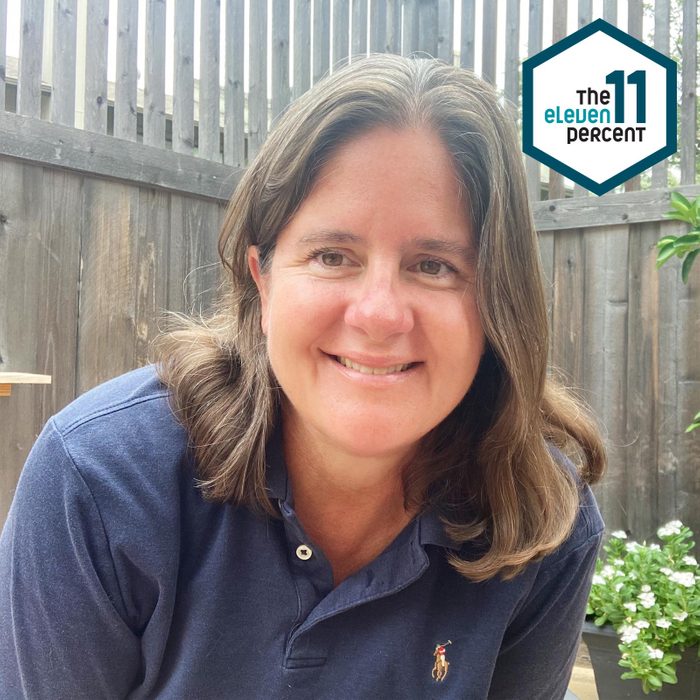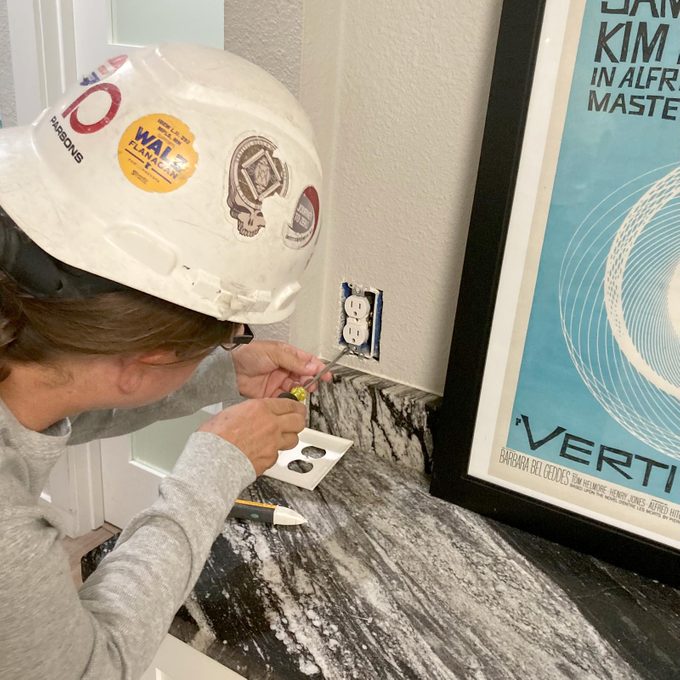The Eleven Percent: Meet Ally Childress, Journeyworker Electrician

Electrician Ally Childress talks about working on a stadium, how to be inclusive and what's in her tool bag.
Our editors and experts handpick every product we feature. We may earn a commission from your purchases.
This FH series introduces readers to a few of the women who make up 11 percent of the construction workforce in the U.S., spotlighting stories of their careers in the field. Know someone we should feature? Email us here.
Ally Childress loves to learn. In her 20s, she had a blast earning her degree in English literature. Twenty years later, she equally enjoyed going back to school to study electricity.
Between those two major education stints, she worked in an entirely different field: science. She monitored water quality for a government agency, then tested food for pathogens at a multinational food safety company.
After a decade, she didn’t see herself moving up since her degree didn’t match her position. She decided instead to pursue a career in the trades, where she could use her more technical inclinations, and started researching possibilities. “Electrician just jumped out at me, so I signed up,” she says.
Childress completed the five-year International Brotherhood of Electrical Workers (IBEW) apprenticeship program in Minnesota in 2020. The program features one day of school and four days of work weekly, a model she loved.
“I learned that I’m a bit of a code nerd,” she says. “There are rules that must be followed to make electricity safe for the people using it, and they can be pretty dense and difficult to parse. Learning the code turned out to be my favorite part of the process.”
After completing her apprenticeship she became a journeyworker, which Childress truly enjoys. But in the summer of 2021, an nagging ankle injury forced her off the jobsite. She’s currently healing in Texas, where she and her wife recently moved to be closer to family.
We caught up with Childress for her thoughts on the state of the electric industry.
On This Page
Q: Which projects stand out to you?
A: My first job was the U.S. Bank Stadium in Minneapolis, which I worked on for a year. The scale was enormous, with a couple hundred electricians. I got paired with this abrasive foreman who was about to retire. He’d spit tobacco and yell at everybody, but he ended up being great. I stuck with him and learned so much.
First I worked on the major switchgear, which controls the big power coming in, and then up on the catwalk for nine months, which is like 300 feet in the air. I felt very privileged to start on such a monumental project. It was so fun. And now to watch it on TV and know I helped build that, that’s just the neatest feeling in the world.
Q: What changes have you seen in the electric field?
A: I’ve only been in the trades about seven years, so it’s not like I have a vast opinion. But even in that time I’ve seen a major change in how the folks in charge relate to the workers on their crews.
For example, my foreman on the U.S. Bank Stadium’s approach was to yell at people, whereas my other bosses have taken a more collaborate approach. This generational shift from old school to the younger generations is completely obvious to me.
Q: Moving forward, what changes do you hope to see?
A: It’s nice to see more women working as foreman in the field. But I would also like to see more women in company hierarchies, in the boardrooms. Because any time there’s diversity in leadership, you’re going to see different perspectives come down the chain.
I would also like to see more outreach to young women. The trades are something that need to be un-stigmatized. College is wonderful, but a lot of kids can benefit from trade school and apprenticeships, too. They don’t need to take on $100,000 of debt to make a really good living as an electrician.
Q: Any pros or cons to being a woman in the electric trade?
A: I don’t know if it’s because I’m older or because I tend to defuse situations, but I haven’t had a whole lot of consternation about being a woman in the trades.
There are a few jerks, where I’ve thought, “I can’t believe he just said that sexist nonsense.” But I’ve found that if I’m good at my job and work hard, most men are amenable to having me around. I can’t say enough positive things about the guys I’ve worked with.
One observation I’ve had is that people have their eyes on women, because we can be a novelty. If you make up only 10 percent of the jobsite, you stand out, good or bad. And if you’re the one woman on the site, you become all of the women on the site. That makes you hyperconscious of yourself, because if you stand out in a bad way, you’re going to give all women a bad name.
That being said, companies have really made strides in being welcoming. There’s a huge untapped potential of women, and I think companies are understanding that.
Q: How can bosses and coworkers be more inclusive?
A: I want to be thought of as a good electrician, not a good woman electrician. I’ve had a few coworkers say stuff like, “You’re really good at this for a girl.” Guys, that’s not a compliment.
Q: Any advice for young women looking to get into electricity or other trades?
A: Besides going through a union apprenticeship program, just keep your mind open. A lot of young women don’t consider the trades because they’ve been kind of stigmatized, but they’re a great option.
The trades are filled with smart, motivated people who have it going on. They’re happy, make a great living, take vacations and have excellent health care. Then, more practically, show up on time. Don’t look at your phone. Ask questions, but also listen and be observant. And wear your hair up so it’s not a safety issue.
Q: Any advice for staying healthy while working such a physical job?
A: Don’t ignore pain. I wouldn’t have been sidelined for nearly a year if I had gotten my ankle looked at first, rather than worked in pain for months.
I don’t like to complain, or let people down by making them pick up the slack for me not being there, but now I realize it’s okay to take time off. We have great health care. Go to the doctor. Take time to rest your body. You have to keep yourself healthy or you won’t be able to do it very long, because it’s an extremely labor-intensive job.
Q: What are your pro-specific tools?
A: First and foremost, a non-contact voltage tester to make sure circuits are dead before working on them. Fluke is a great brand. Then, obviously, wire strippers, because you use them a thousand times a day. I like Ideal Reflex Super-T because they’re comfortable and they always work.
You’ll never see anybody without lineman’s pliers, which we call Kleins after the brand name. They’re for cutting, twisting, pulling and straightening wire, plus hammering, prying, cutting screws, etc.
You also need a screwdriver. Klein makes the best six-inch square shank slotted one. It’s incredibly sturdy and the square shank means you can use a wrench on it to gain torque.
I always have a pair of tongue-and-groove pliers, commonly called channel-locks because the best and most ubiquitous brand is Channel Lock. Small-sized ones, which we call baby channel locks, are handy to carry around, give plenty of torque and are good for tightening locknuts in small boxes.
Finally, you can’t put up pipe, panels or boxes without a torpedo level, or you’ll look like a hack and nothing will fit. It’s also a must for bending pipe, drawing straight lines and measuring slope.
Ally Childress Bio
After two fulfilling careers in the science industry, Ally Childress joined the International Brotherhood of Electrical Workers as a first-year apprentice. She’s now a journeyworker and freelance writer whose work appears frequently on FamilyHandyman.com. Childress grew up in Oklahoma and lives near family in Texas but calls Minnesota home. She and her spouse hope to one day get out of the I-35 corridor.
Writer Karuna Eberl Bio
Karuna Eberl is a regular contributor to FamilyHandyman.com. She’s spent the last 25 years as a freelance journalist and filmmaker, telling stories of people, nature, travel, science and history. Eberl has won numerous awards for her writing, her Florida Keys Travel Guide and her documentary The Guerrero Project.




